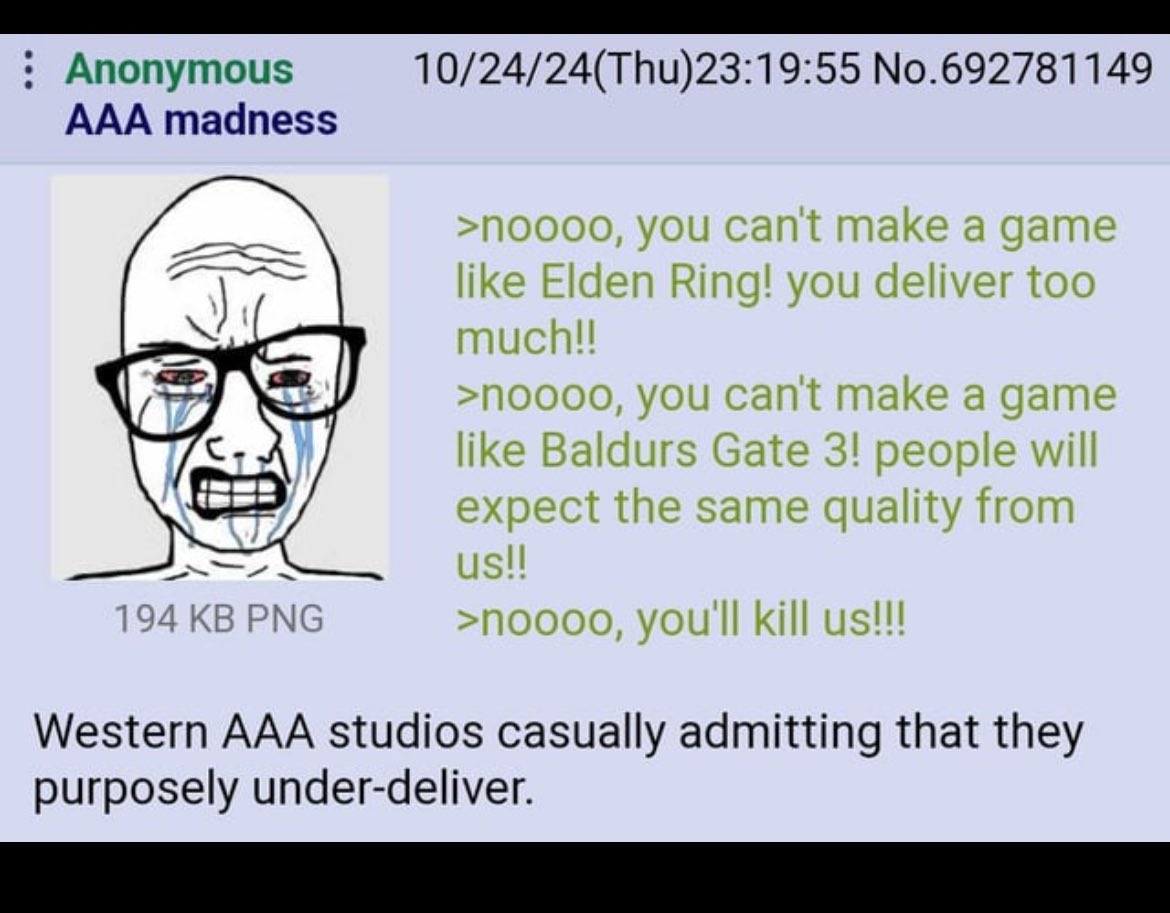this post was submitted on 08 Jan 2025
743 points (96.6% liked)
Greentext
4743 readers
1531 users here now
This is a place to share greentexts and witness the confounding life of Anon. If you're new to the Greentext community, think of it as a sort of zoo with Anon as the main attraction.
Be warned:
- Anon is often crazy.
- Anon is often depressed.
- Anon frequently shares thoughts that are immature, offensive, or incomprehensible.
If you find yourself getting angry (or god forbid, agreeing) with something Anon has said, you might be doing it wrong.
founded 1 year ago
MODERATORS
you are viewing a single comment's thread
view the rest of the comments
view the rest of the comments

And that's exactly the problem with AAA, they tend to take the lower risk path.
Indies have to take massive risks to stand out, and while most fail, the few that stand out are absolutely incredible. They can't rely on the GFX or marketing departments to carry the game for them, it has to be so good people want to share it with their friends. One of the first indies I played was FTL, and that was because a friend recommended it to me.
The estimates I've seen are that BOTW is ~$120M, whereas AC games are >$300M (even $500M). Figures like these are hard to come by, especially for Nintendo, and they're generally not very comparable since different studios need different marketing budgets.
So mostly Nintendo and Sony, and a handful of others. Note, these are pretty much all Japanese studios, who are generally known for more frequent, smaller-scale, and more inventive game releases.
The problem seems to be more an issue with western AAA studios, so Rockstar (Red Dead kind of diversified them), Activision/Blizzard (lots of samey games, little innovation), Ubisoft, EA (they're great at killing interesting ideas), etc. They spend way too much on graphics and way too little on interesting content. Rockstar is the only one on the list that I've played a recent game from, assuming you consider RDR2 and GTA V "recent."
Favorite studios release good games with a reasonable length that aren't massive open-world collectathons. In fact, I didn't even really like BOTW, despite praising them for trying something new (I hate that they killed the best part of Zelda to me: dungeons). It's not that I don't like open world games in general (love Elder Scrolls games), I just don't like games that are open world for the sake of it, and that's what seems to balloon budgets and encourages filler.
No, for Kojima's sake, it's not the problem with AAA, it's the problem with Ubisoft. Some of Ubisoft, at that. I'm running out of ways to say this.
You keep trying to crunch this down to this small mental model of AAA as Ubisoft-like practices, or maybe Ubisoft, Bethesda and Activision or whatever. It's just not accurate.
The budget estimates you're using are almost certainly not accurate, and neither are your assumptions about Nintendo and Ubisoft's relative sizes. Nintendo has 50x the capitalization of Ubisoft, and is famously one of the most cash-rich companies in the industry (and in Japan). Even if your estimate of Assassin's Creed's budget was correct, Nintendo could fund 100 Assasin's Creed games tomorrow and still have resources left over to make a bunch of other first party games.
Also, no, my list isn't "mostly Nintendo and Sony" or "all Japanese Studios". At a glance it includes games made by ten publishers and fifteen development studios. It includes six games made primarily in the US, five made in Europe and seven made in Japan. It's actually a pretty even split. Not that it matters, because I could put together a whole other list like that in two minutes.
You are trying really hard to make this into a simple distinction between two types of games, broken by game size for some reason and I'm sorry, but reality just doesn't want to play ball with that categorization. AAA isn't just the four companies you don't like (and, for the record, you keep mixing up publishers and developers through this whole thing) and those four companies aren't even consistently bad or consistently producing only the types of games you describe. Your view of this is just overly simplistic.